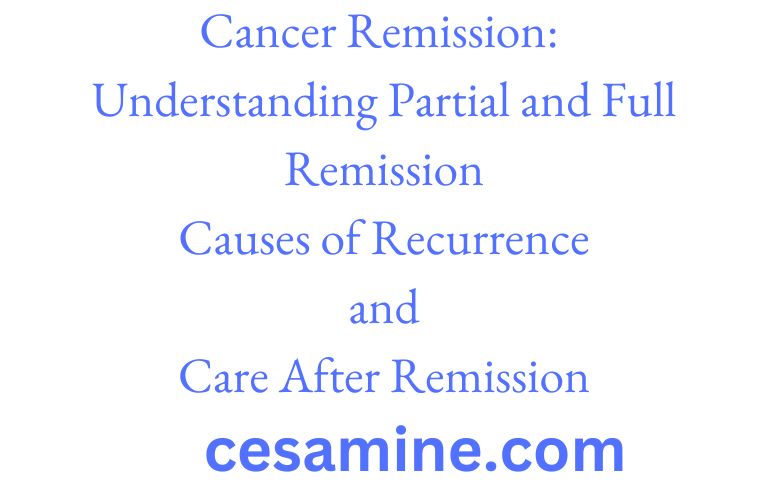What does cancer remission entail, and what causes recurrence?
Remission may persist for a number of weeks, months, or even years while receiving cancer therapy or after.
Remission, in its simplest form, refers to the disease’s resting stage, or the time when a cancer has been successfully treated and is being kept “under control.” During or after therapy, remission may extend for a number of weeks, months, or even years.
What time does remission happen?

The National Cancer Institute (NCI) states that a patient must have fewer or milder symptoms in order to be classified as being in remission.
A person’s cancer is not always cured if they enter remission. When cancer is “cured,” it indicates that there are no longer any signs of the condition in the body and that it won’t come back. Cancer may return or relapse because cancer cells are still present in the body throughout remission.
Remission, both partial and full
Partial and full remissions are the two different forms of remission.
When a cancer is in partial remission, it has responded well to therapy and has lessened in size. Even if the person’s illness symptoms may be less severe as a result, they are nonetheless there.
A complete remission occurs when the body is free of all indications, symptoms, and remnants of cancer cells. Some medical professionals believe they may declare the patient healed after five years of total remission.
Complete remission does not guarantee that the cancer is no longer present since it might return years later. However, a fresh phase of therapy may put the cancer into a new remission even if the illness reappears after a full remission.
Care after remission
When a patient begins cancer therapy, the physician will need to monitor how the patient is handling the condition. The oncology team of physicians may need to modify the course of therapy if a patient has a partial remission in order to facilitate a full remission.
Following full remission, the patient must continue to undergo routine checkups so that the doctor can keep an eye out for any signs that the illness could recur. If this happens, more treatment may be required.
According to the National Cancer Institute, follow-up exams will typically be necessary every three to four months for the first two to three years after treatment. The doctor is likely to plan regular check-ups for a year if the illness remains dormant during that time. These yearly check-ups will involve a physical examination, blood testing, and other tests tailored to the patient’s past history of cancer.
Patients who have dealt with this devastating illness may talk about any mental or physical issues that have arisen as a consequence of their struggle with cancer during these assessments. It is advised that the patient share any new or persistent medical symptoms with the doctor. It’s not always the case that symptoms indicate a cancer recurrence.
Those who have had remission should see their doctor before using any new drugs or dietary supplements, making any changes to their family’s medical history, or if they have any depressive or anxious symptoms. Additionally, side effects from cancer therapy might appear months or years after receiving medical attention. You should also talk to your doctor about them, which are referred to as late effects.
What does relapse mean?
Recurrence is derived from the Latin word recidivus, which means to repeat. In a medical sense, it refers to the illness returning after a period of remission. Although the majority of malignancies return within the first five years, this is not always the case.
Cancer may recur in the same location where it initially appeared or spread to other parts of the body. When the illness first manifests, doctors will check to see whether it is the same sort of cancer or if an entirely new form has emerged.
Does cancer usually recur after remission?
The cancer does not always come back after a patient has remission from therapy, of course.
According to the ACS, physicians cannot foresee if or how probable it will be for the illness to recur. However, as they note, the likelihood of a recurrence increases if the disease spreads quickly, has progressed, or has metastasized. Even if there is a recurrence, therapy may bring the patient back to full remission.
- Understanding Anal Cancer: Symptoms, Diagnosis, and Treatment
- Understanding Anaplastic Thyroid Carcinoma: Symptoms, Diagnosis, and Treatment
- Understanding Cancer Stages: What They Reveal About Your Disease
- Understanding Head and Neck Cancer: Symptoms, Causes, Risk Factors, and Treatment Options
- Understanding Heart Cancer: Symptoms, Causes, Diagnosis and Prevention
- Understanding Non-Lymphoma Hodgkin’s: Symptoms, Causes, and Treatment
- Understanding Pancreatic Cancer: Symptoms, Risk Factors, and Early Detection
- Understanding the Risks of Ovarian Cancer and How to Stay Safe
- Understanding Vocal Cord Cancer: Symptoms, Causes, Diagnosis, and Treatment
- What Are The Additional 12 Cancer Symptoms And Signs?
- Cancer Deaths More Common Among Older Adults With Type 2 Diabetes
- Cancer Stem Cells Are Fueled Through Dialogue With Their Environment